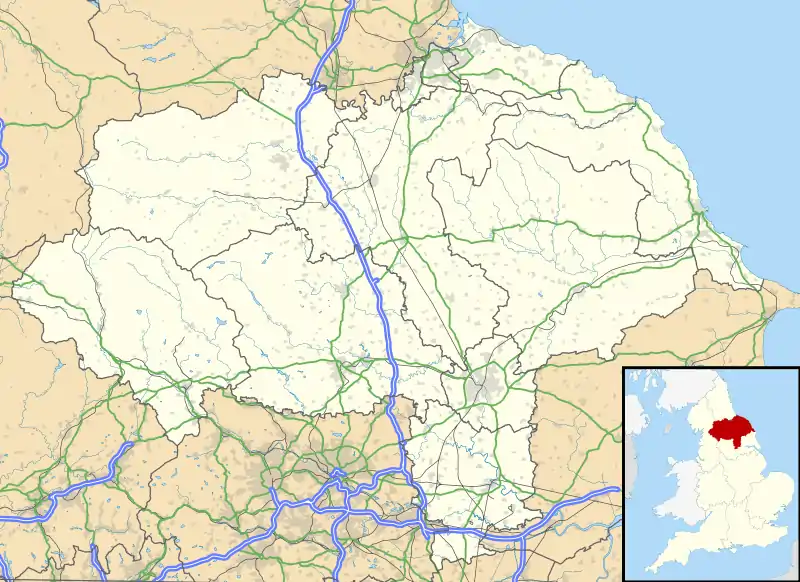Middlesbrough Town Hall
Middlesbrough Town Hall is a municipal facility located in Albert Road in Middlesbrough, North Yorkshire, England. It is a Grade II* listed building.[1]
| Middlesbrough Town Hall | |
|---|---|
 | |
| Location | Middlesbrough |
| Coordinates | 54°34′33.8″N 1°14′02.5″W |
| Built | 1889 |
| Architect | George Gordon Hoskins |
| Architectural style(s) | French Gothic |
Listed Building – Grade II* | |
| Designated | 17 July 1968 |
| Reference no. | 1136659 |
 Location of Middlesbrough Town Hall in North Yorkshire | |
History
.jpg.webp)
The current building was commissioned to replace an older and much smaller town hall in the Market Place in the St Hilda's part of the town which had been designed by W. L. Moffat of Doncaster and which had been completed in 1846.[2][3][4] After population growth, largely associated with the steel industry, Middlesbrough became a municipal borough in 1853 and civic leaders decided to procure a new town hall on open land in a developing area to the south of the Middlesbrough branch of the Stockton and Darlington Railway.[5]
The foundation stone for the new building was laid in 1883: it was designed by George Gordon Hoskins of Darlington and built at a cost of £130,000.[6] The official opening was performed by the then Prince and Princess of Wales (later King Edward VII and Queen Alexandra) on 23 January 1889.[7][8]
The building is of sandstone ashlar with slate roofs, built around four sides of a courtyard with the main town hall on the north side. As well as offices and conference rooms, it contains a still intact, fully restored courtroom and a sizeable theatre. The basement crypt also serves as a concert hall. It is built in a revived "French Gothic" style, with courtyard elevations in a "Domestic Revival" style. It was one of the last large Gothic style town halls to be built in England, towards the end of the 19th century. The town hall element has one storey centre with two-storey end pavilions. The building features statuary by W. Margeston of Chelsea. To the east are a complex of modern civic buildings linked by a bridge passage.[1]
Queen Elizabeth II, accompanied by the Duke of Edinburgh, visited the town hall on 4 June 1956[9][10] and the singer, David Bowie, performed in the hall on 8 June 1972.[11] From 1 April 1974 to 1 April 1996 the Town Hall also served as the meeting place of Cleveland County Council.[12]
A multimillion-pound plan to transform the town hall into a top class cultural and heritage venue was announced by Middlesbrough Council in 2015. Plans include an upmarket bar, coffee shop or restaurant with a glass atrium, a new multi-functional community room, new seating and toilets, lighting to illuminate the building at night and refurbishing of the theatre and crypt. Plans also include opening up parts of the building currently inaccessible to the public, including the Victorian courtroom, cells and fire station which would be made into heritage attractions in their own right. Work began in April 2016 with an expected 21 month timeframe required to complete the work.[13][14][15] The refurbishment was completed in March 2018 ahead of re-opening in May 2018.[16]
Theatre and crypt
Middlesbrough Town Hall has a 1,190-seat theatre with a proscenium stage and balcony seating. It presents a well-preserved example of a Victorian concert hall: it features an organwith four manuals which was designed and built by William Hill & Sons in 1898.[17] There is a second concert hall, known as the Crypt, which is beneath the main theatre hall. It contains a large bar, catering outlet and capacity for up to 600.[18]
Concerts
Iron Maiden played at the town hall in 1980[19] and 1981.[20]
References
- Historic England. "Town Hall and Municipal Buildings, Middlesbrough (1136659)". National Heritage List for England. Retrieved 21 September 2019.
- Historic England. "Old Town Hall (1139853)". National Heritage List for England. Retrieved 13 July 2019.
- "Plea for old 1846 Middlesbrough Town Hall to be used again". BBC. 12 March 2020. Retrieved 3 December 2020.
- "Decaying historic landmark and derelict pub could have bright future under new plans". Teesside Live. 11 September 2020. Retrieved 3 December 2020.
- "Ordnance Survey Map". 1857. Retrieved 4 December 2020.
- "Middlesbrough". Local Histories. Retrieved 21 September 2019.
- Woodhouse, Robert - Middlesbrough - A Pictorial History (Phillimore & Co. Ltd. Publishing, 1990 ISBN 0 85033 743 7); illustration no.48
- "Middlesbrough Town Hall engraving recreated". BBC. 26 January 2019. Retrieved 4 February 2021.
- "Incredible colour footage of Stockton and Norton in 1956 as 150,000 Teessiders greeted the Queen". Teesside Live. 1 April 2018. Retrieved 26 November 2020.
- "Visit of Queen Elizabeth and Duke of Edinburgh (4 June 1956)". My Town My Future. Retrieved 26 November 2020.
- "David Bowie: Memories of when fans paid 60p to see him play in Middlesbrough". Teesside Live. 11 January 2016. Retrieved 11 December 2020.
- Whitaker's Almanack 1979, p. 630
- "Middlesbrough Town Hall gears up for closing party - but who has graced its stage in the past?". Middlesbrough Gazette Live. Retrieved 1 June 2016.
- "Middlesbrough Town Hall will get third space for performances thanks to £500,000 grant". Middlesbrough Gazette Live. Retrieved 1 June 2016.
- "Multi-million pound plans to transform Middlesbrough Town Hall given final approval". Middlesbrough Gazette Live. Retrieved 1 June 2016.
- "Town Hall hand-over marks end of major make-over". Middlesbrough Council. 29 March 2018. Retrieved 19 April 2018.
- "Details of Town Hall, Middlesbrough, England". Organ Biography. Retrieved 15 November 2020.
- "Middlesbrough Town Hall". This is Middlesbrough. Retrieved 21 September 2019.
- "Iron Maiden". Setlist. 1980. Retrieved 5 October 2019.
- "Iron Maiden". Setlist. 1981. Retrieved 5 October 2019.